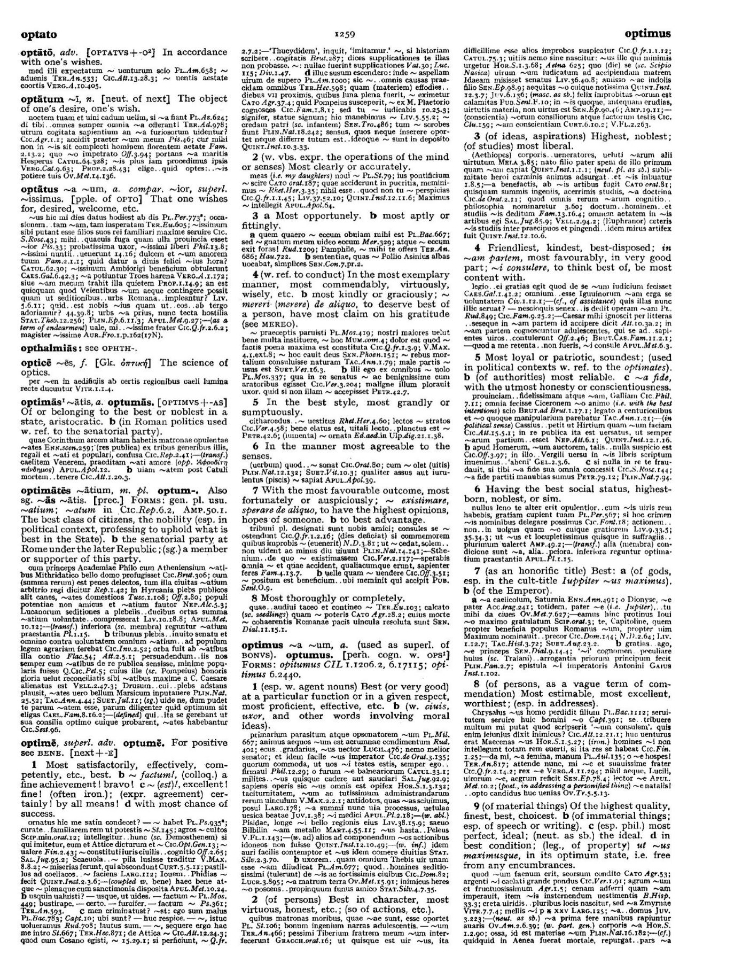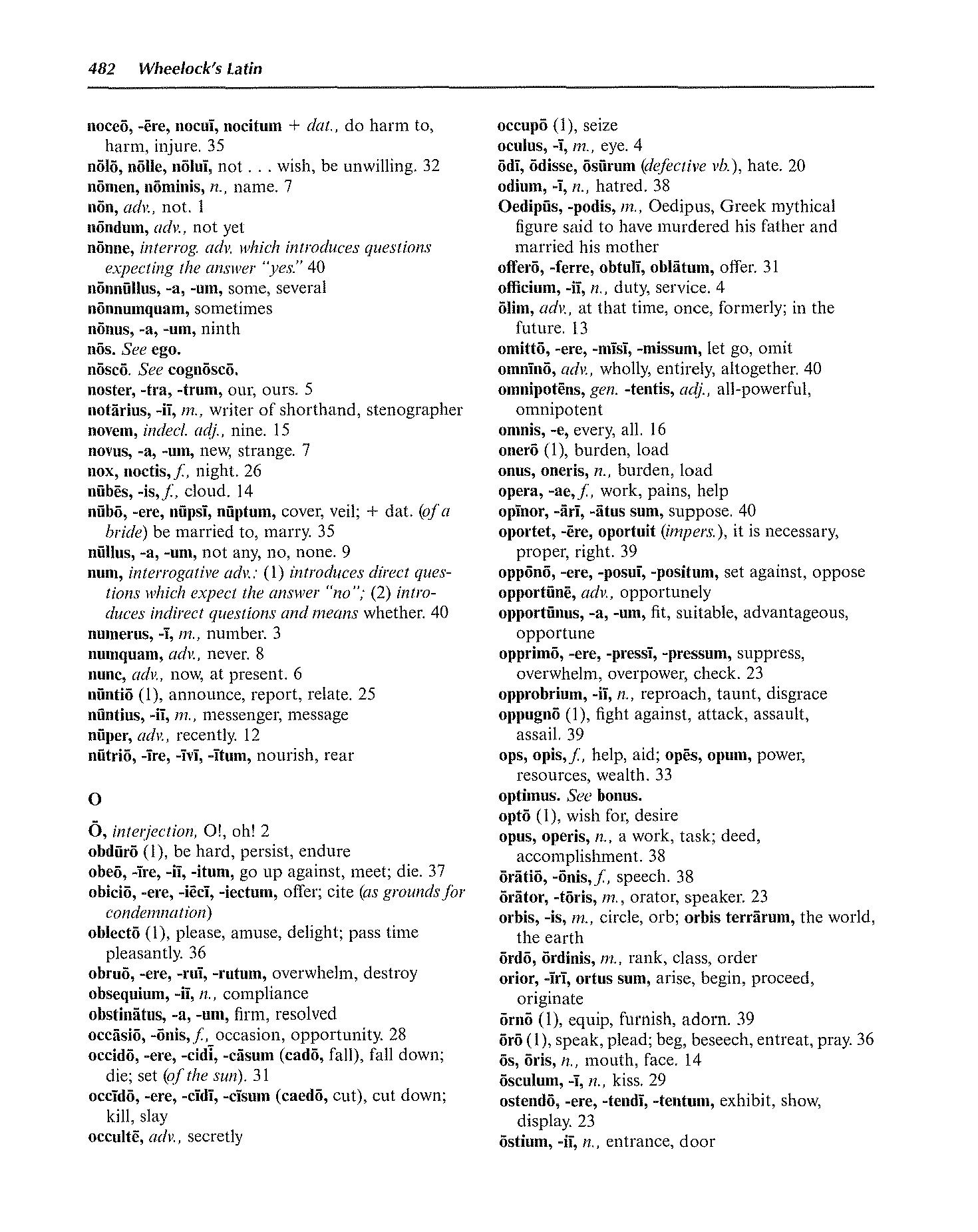
page_listing.tpl
page_subListingDetails.tpl
sub_listingDetails_style1.tpl
sub_listingDetails.title.tpl
optimus best
optimus is a Latin Adjective that primarily means best.
Definitions for optimus
Wheelock's Latin
Adjective
- 1
See Bonus
Oxford Latin Dictionary
Adjective
- 1
(used as superl. of BONVS) (esp. w. agent nouns) Best (or very good) at a particular function or in a given respect, most proficient, effective, etc. (b) (q. ciuis, uxor and other words involving moral ideas).
- 2
(of persons) Best in character, most virtuous, honest, etc.; (so of actions, etc.).
- 3
(of ideas, aspirations) Highest, noblest; (of studies) most liberal.
- 4
Friendliest, kindest, best-disposed; in ~am partem, most favourably, in very good part; ~iconsulere, to think best of, be most content with.
- 5
Most loyal or patriotic, soundest; (used in political contexts w. ref. to the optimates). (b) (of authorities) most reliable. (c) ~a fide, with the utmost honesty or conscientiousness.
Sentences with optimus
Latin to English
Facillima saepe nōn sunt optima.Compare The easiest things often are not the best.
Optimōs librōs tantā cum cūrā lēgērunt ut multum sapientiae discerent.Compare They read the best books with such great care that they learned much wisdom.
Optimī librī discipulīs legendī sunt ut vēritātem et mōrēs bonōs discant.Compare The best books ought to be read by students in order that they may learn the truth and good character.
Optimīs rēbus semper studēte sī vērē esse fēlīcēs vultis.Compare Always study the best subjects if you wish to be truly happy.
Trahimur omnes studio laudis et optimus quisque maxime gloria ducitur. Ipsi illi philosophi etiam illis libellis, quos de contemnenda gloria scribunt, nomen suum inscribunt.Compare We are eager for praise, even the noblest men are strongly motivated by the desire for praise. On the very books in which philosophers tell us to despise fame, they inscribe their names.
Data sources
Notes
- Definitions
- Frederick M. Wheelock, Wheelock's Latin, 6th ed., rev. Richard A. LaFleur (New York, NY: HarperCollins Publishers, 2005): 482.
- P. G. W. Glare, Oxford Latin Dictionary, Vols. 1-8 (Oxford: Clarendon Press, 1982): 1259.
- Word frequencies
- Paul B. Diederich, The Frequency of Latin Words and Their Endings, PhD diss., (Columbia University, 1939).
Bibliography
Allen, Joseph H. Allen and Greenough's New Latin Grammar for Schools and Colleges: Founded on Comparative Grammar. Edited by James B. Greenough, George L. Kittredge, Albert A. Howard, and Benjamin L. D'Ooge. Boston, MA: Ginn & Company, 1903.
Crystal, David. A Dictionary of Linguistics and Phonetics. 6th ed. Oxford, UK: Blackwell Publishing, 2008.
Delatte, Louis, Suzanne Govaerts, Joseph Denooz, and Etienne Evrard. Dictionnaire fréquentiel et index inverse de la langue latine [Frequency Dictionary and Inverse Index of the Latin Language]. Liège, Belgium: Laboratoire d'analyse statistique des langues anciennes de l'Université de Liège (L.A.S.L.A.), 1981.
Diederich, Paul B. The Frequency of Latin Words and Their Endings. PhD diss., Columbia University, 1939.
Francese, Christopher. "Latin Core Vocabulary." Dickinson College Commentaries. Last modified 2014. http://dcc.dickinson.edu/latin-vocabulary-list.
Gildersleeve, Basil L., and Gonzales Lodge. Gildersleeve's Latin Grammar: Third Edition, Revised, and Enlarged. 3rd ed. London, England: Macmillan and Co., 1903.
Glare, Peter G.W. Oxford Latin Dictionary. Vols. 1-8. Oxford, England: Clarendon Press, 1982.
Krüger, Bernd. "Latin Conjugation Tables." Cactus2000. Accessed May 5, 2023. https://latin.cactus2000.de/index.en.php.
Pierson, Nick. "Sound of Text." Accessed October 26, 2019. https://soundoftext.com.
Wheelock, Frederick M. Wheelock's Latin. 6th ed. Revised by Richard A. LaFleur. New York, NY: HarperCollins Publishers, 2005.
Wiktionary Contributors. "Victionarium." Wikimedia Foundation, Inc. Updated March 18, 2019. https://la.wiktionary.org/wiki/Victionarium:Pagina_prima.
Citation
Chicago (17th ed.)
Allo Contributors. "optimus (adj.) - Latin Word Definition." Allo Latin Dictionary. Last modified . Accessed February 19, 2026. http://ancientlanguages.org/latin/dictionary/optimus.
Entry created on . Last updated on .








